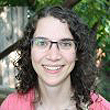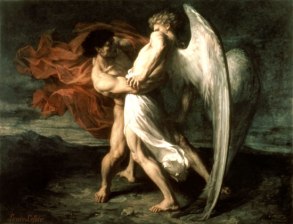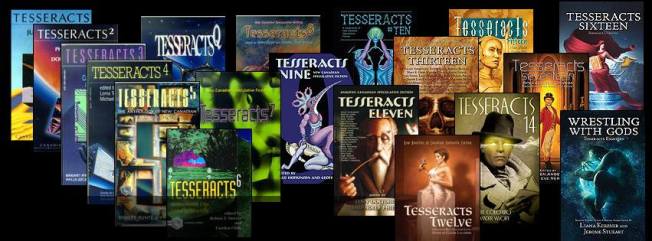
“Tesnim Sayar is a Muslim punk. She wears both the headscarf and a mohawk and dreams of living of her own design. And like other supporters of the Muslim punk movement Taqwacore, she sees no contradiction between punk and Islam.”–PostModernismRuinedMe Tumbr.
This is fifth in a series of guestblogposts for the 18 days of Tesseracts. Janet K. Nicolson wrote “A Cut and a Prayer” included in Wrestling With Gods: Tesseracts 18.
by Janet K. Nicolson
I have talked in a few places about my experience writing “A Cut and a Prayer” for Tesseracts 18: Wrestling with Gods, so I don’t want to delve into too much detail about how the story came about.
For those of you who haven’t read the story, it follows the tale of Samar, a doctoral candidate in sociology and religious studies who feels she has lost her once strong connection with Allah. She seeks futuristic medical intervention to try and tackle her depression. The story contains many references to Samar’s Islamic faith, and explores how Samar and her mother tackle their faith differently.
This August, I attended When Words Collide in Calgary for the first time, and presented on a panel about Faith in SF and Fantasy. One of the topics I discussed was the process of writing about a faith that is different from my own. How, someone asked, do you approach the research?
I want to share a few of the things I learned, so that hopefully if you, the reader, ever want to write a story about faith, you don’t feel scared about tackling the research!
Tips to researching/writing about faith:
- Assume everything you read is biased from one direction or another. Articles written by people of a faith will be different than articles written by someone of a different faith, someone who is a religious scholar, someone who is an atheist, etc. Also, don’t assume that bias invalidates information! Faith is a people based thing, and is necessarily a grey, complicated area where everyone has different viewpoints.
- Start with the Wikipedia article. I say this a bit tongue in cheek because Wikipedia can be as biased as anything, but it is also a great starting point. Wikipedia articles provide you with information about the history of a religion (from a non-faith standpoint), common cultural practices, geographic distribution, etc. It will help you root the religion in the real world.
- Pay particular attention to the pages about rituals, practices, if there are any. Most of the time, we base our perception of a religion on what we see on TV or in a book, because we don’t see what happens directly in a house of worship. In my instance, I knew Muslims prayed several times a day, but I didn’t know they had a religious “creed” commonly known as the 5 Pillars that they try to uphold as part of their faith.
- Check the links at the bottom of the Wikipedia article. Where do they go? Try and find a good combination of material, from other research articles, to interviews, to news articles. Start to branch out this way.
- Find an online forum for the faith and read what people are discussing. I found a great forum (the name escapes me now) for modern Muslims, and they had a thread where they were discussing the most inspirational quotes in the Qur’an. Many of the people were younger, and so after sampling quite a few conversations I had an idea of how Samar might be inspired by her religion’s teachings. Researching real people is an absolute must, especially if your protagonist is of the faith you are studying. It’s one thing to know the history of the religion; it’s another to know how people currently engage with it.
- Do a Google Image search! You can learn a lot about how people of a given faith dress/look in North America and around the world. You might be surprised by the variety of what you see.
- Read people’s opposing arguments to items of faith, whether they are from that religion or not. It’s important to understand the social environment around a faith, so you can either write an accurate present or extrapolate into the future. For example, I researched anti-Muslim bias in the USA, as well as modern Muslim discussions of Qur’an interpretations while working on my story. This helped me understand the world, and the racism, that Samar might live in.
- Talk to someone of that faith. In my case, I was lucky because I had previously taught three Muslim students (all women) who in the context of the class had discussed their faith and/or their lifestyles. They were all very different in attitude and dress (as we should expect of any 3 human beings, realistically), and so helped me understand Samar from various angles. If you don’t have this kind of opportunity, contact a local house of worship and ask if you can join a service. My local university does this as part of its religious studies classes and from what I’ve heard, no one has ever been turned away from any place when they’ve requested to attend and learn more. (You might learn about faith, you might also learn about new and tasty foods post-service!)
- Be open to understanding your own biases. We all have them. We are a social species and we develop opinions based on what we see and read. Look at your biases closely, and be aware of them so that when you write, you aren’t unconsciously writing your faith character from those prejudices.
- Check the spelling. Some words have different English spellings depending on how they are translated. Do your due diligence and triple check everything from multiple sources. And make sure words are spelled consistently throughout your story!
Finally, the most important point:
- Don’t be afraid to research or write about faith. My faith is complicated, but I’m not scared to write about faith in general because it is a fundamental and unavoidable part of the human condition. We all have faith in something, whether it is a religion or a science. Bringing faith into a story doesn’t make something a proselytizing creed. It just makes it realistic.
Happy writing!
________________________________
 Janet K. Nicolson was born in Regina and has lived in the ice and cold ever since. She currently works as a technical writer for a telecommunications firm. When she’s not watching her border collie herd her cat and husband around the house, she can be found searching the local book store for novels about Big Dumb Objects, rocking video games, or subjecting audiences to her piano compositions.
Janet K. Nicolson was born in Regina and has lived in the ice and cold ever since. She currently works as a technical writer for a telecommunications firm. When she’s not watching her border collie herd her cat and husband around the house, she can be found searching the local book store for novels about Big Dumb Objects, rocking video games, or subjecting audiences to her piano compositions.
Nicholson’s work has previously appeared in On Spec Magazine, and will be appearing in two forthcoming issues.






 Writing is a Sacred tradition in many cultures. We revere the books that come from these cultures. It’s also a very sacrificial act, one that takes a lot of courage, honesty, and time. I’d like to talk about writing during Lent.
Writing is a Sacred tradition in many cultures. We revere the books that come from these cultures. It’s also a very sacrificial act, one that takes a lot of courage, honesty, and time. I’d like to talk about writing during Lent.
